Islam. Close Alliance with Power.
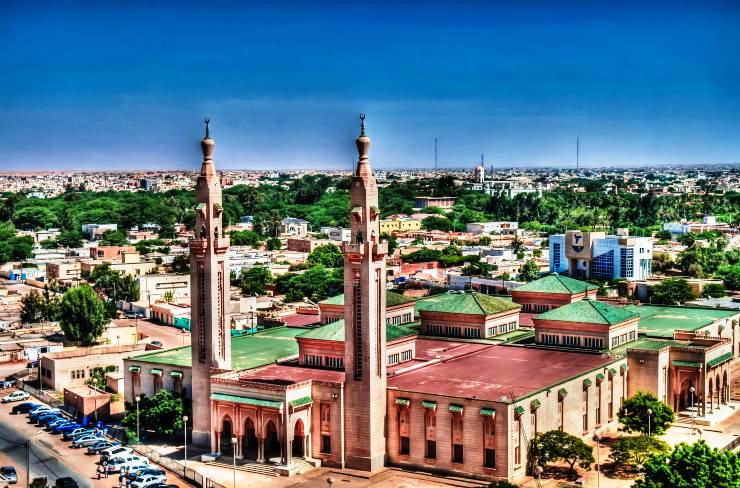
The Muslim religion is the unifying feature of Mauritanian culture and society which, however, presents notable differences in other aspects.
To fully understand the extent of Islam’s role in the country, we must start from the decision taken in 1958 when it was not yet independent, to define itself as the Islamic Republic of Mauritania. It might seem obvious since the country is totally Muslim, however, the reasons are political.First of all, they wanted to make Islam distinctive compared to the other colonies of French West Africa, first and foremost because, even after independence (1960), it was claimed that historically the country belonged to the Moroccan monarchy. The second reason was the profound social fracture, which exists to this day, between the white Maura elite and the black population, enabling forms of slavery to persist and Islam seeks to be the unifying and cultural trait of society.
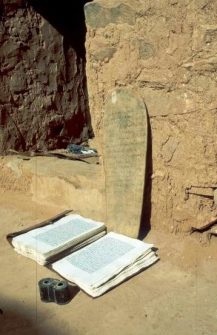
The Islam of Mauritania is a Sunni Islam of the Malekite tradition. File swm
Mauritanian Islam, Sunni Islam of the Malekite tradition, has been characterized since the 18th century by the presence of Sufi confederations and at the same time by the popular rooting of Islam. On the other hand, the Muslim religion shapes the traditional social hierarchy, which gives the literary elite, the Zwaya ethnic groups, knowledge and religious and spiritual power, while on the lowest step of this hierarchy, we find the castes of the tributary shepherds, of “storytellers” and slaves. Islam, therefore, is a factor of social cohesion, as it was during the opposition to French colonialism, even if there has been no shortage of compromises and adaptations.
The Primacy of the Confraternities
The religious panorama is dominated by brotherhoods of which the most widespread are the Qadiriyya and the Tijaniyya. These are, in turn, divided into different branches with links also to neighbouring countries, where they have played an important role in the spreading of Islam, with influences that are not only religious. A branch of the Tijaniyya thus played a peacemaking role in the ethnic-social crisis between Senegal and Mauritania in 1989.
Traditionally the brotherhoods have interpreted a “moderate” concept of Islam. Social transformations, however, have forced them to adapt and today their roots no longer rest on well-defined territorial and social bases such as an entire village, a hamlet or an entire ethnic group but membership occurs mainly on an individual basis.
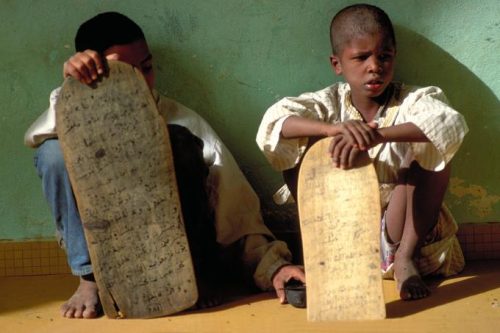
The Arabization of teaching strengthens the cultural orientation towards the Arab-Muslim world. Swm File
The religious elite has been co-opted into the state apparatus, but political power has made Islam above all an element of social cohesion, even if the religious function is progressively institutionalized: ministry of protection, appointment and support of imams, the introduction of Islamic law, etc. The Arabization of teaching, starting from 1966, strengthens the cultural orientation towards the Arab-Muslim world. The emergence of Islamic fundamentalism was rather long and troubled, also favoured by social transformations and in particular by growing urbanization following droughts and famines.
Support by the Gulf States
Since the mid-1980s, rigorist Islam has spread through personalities and associations linked to Saudi Arabia and the Gulf monarchies, such as the World Islamic League, and with the construction of mosques, Koranic schools and Islamic cultural centres.
In addition, the economic aid that the Gulf monarchies bring to a state in difficulty to deal with the needs of the population and social tensions secures them an important role in civil society.
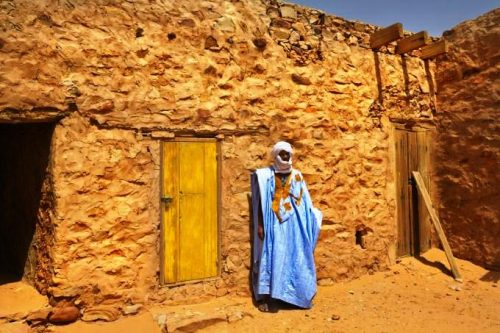
A Muslim young man in national blue clothes and a white turban (tagelmust). iStock/kaikups
The spread of Islam is signalled by two very striking phenomena, for example, there is the construction of mosques. In traditional nomadic society, prayer is carried out outdoors but in the capital Nouakchott, the number of mosques has risen, from one in 1963 to 46 in 1989, to over 4 thousand in 2010 and almost all of them are built with foreign funds. Then there are new behaviours imposed in society, such as more rigorous respect for fasting in the month of Ramadan, the prohibition of alcohol, and the adoption of clothes more in keeping with Muslim ethics for both women and men.
Political Openness
The phenomenon of Islamic fundamentalism appears at the beginning of the 1990s. The attempt to transform some radical groups into a political party, following the example of the Algerian Islamic Salvation Front (FIS), failed due to the refusal of power. On the other hand, the alliance between political leaders and religious organisations, including those of Wahhabi inspiration, is one of the reasons for the disappearance of Islamist terrorism in Mauritania from the end of the first decade of this century up to the present day, while political openness has allowed Islamist parties to play a political role.
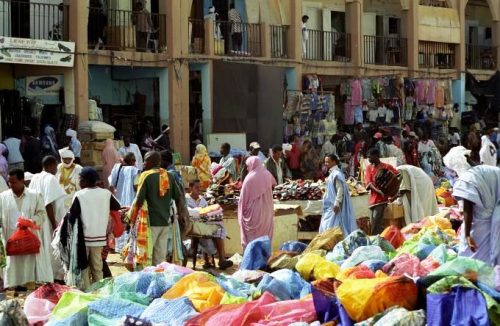
The city market in Nouakchott. Shutterstock/Attila JANDI
The religious debate today touches on specific social issues such as slavery or blasphemy, which have become both a religious-social and racial issue at the same time because they concern the most marginalized groups in society. Both the leader of the anti-slavery movement Biram and the blogger Ould Mkheitir, who became the symbol of the vindication of fundamental rights and freedoms, paid a high price for being outspoken regarding these issues. The blogger was arrested in 2014 after posting an article deemed blasphemous against the prophet Muhammad because he criticized the use of Islam to justify slavery. Sentenced to death the same year, his sentence was later commuted to two years in prison but he was only released in 2019. His story sparked a lively debate in the country; the religious authorities took a stand even by mobilizing the streets against the blogger, pushing the government to toughen the penalties for apostasy and blasphemy with sentences that will no longer take into account any possibility of repentance. The consequence is that since then, active monitoring of the manifestations of thought has been carried out.
Proselytism Prohibited
Rigorism also affects non-Muslims. Last December, around fifteen evangelical Christians were arrested for just over a month for having distributed a video of a baptism ceremony. Proselytism and conversion are in fact prohibited in Mauritania, but some evangelical currents are also active in this direction.
However, relations with the Catholic Church are good and respect the limits imposed on worship and manifestations of faith. Diplomatic relations between Mauritania and the Vatican were established at the end of 2016 and a new apostolic nuncio took office last year.
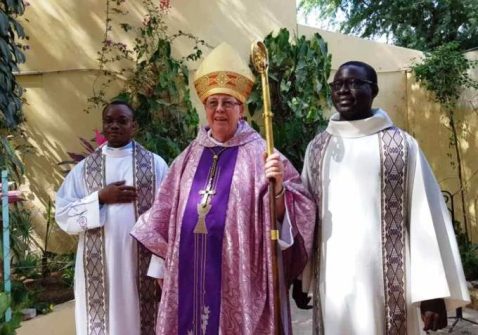
Mons. Martin Happe, bishop of the diocese of Nouakchott. “A Church in Mauritania, not a Mauritanian Church”’ Photo CAN
In an almost totally Muslim country, the Church addresses itself only to foreigners, today mainly made up of sub-Saharan immigrants, and also for this reason the bishop of Nouakchott, Martin Happe, defines it as a Church in Mauritania, not a Mauritanian Church. Caritas, which is recognized by the government, has for many years played an appreciated role in supporting populations struck by natural disasters and economic crises and it also engages in important training activities. (Open Photo: The Aerial view to Saudique Grand Mosque in Nouakchott. Shutterstock/Homo Cosmicos)
Luciano Ardesi



